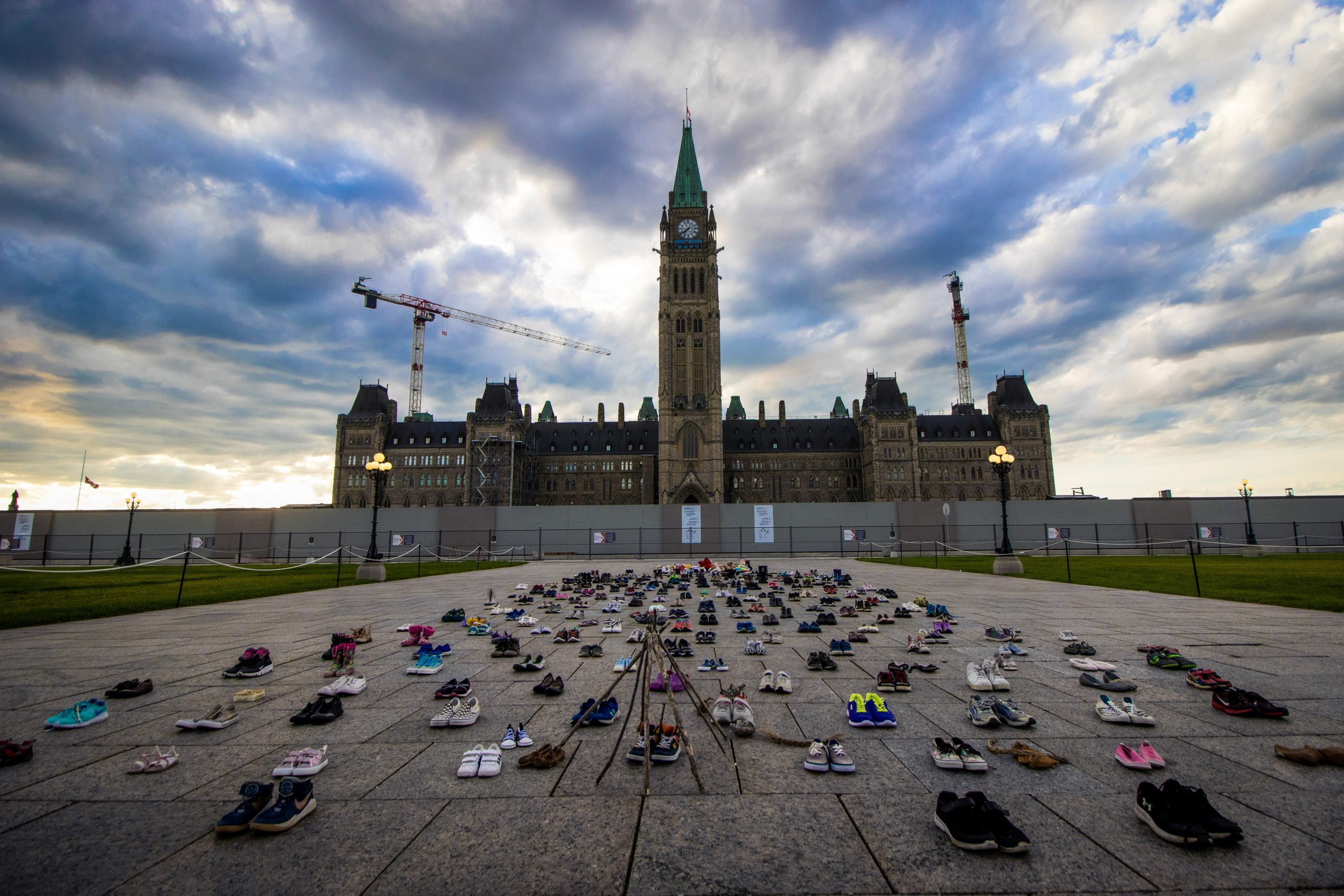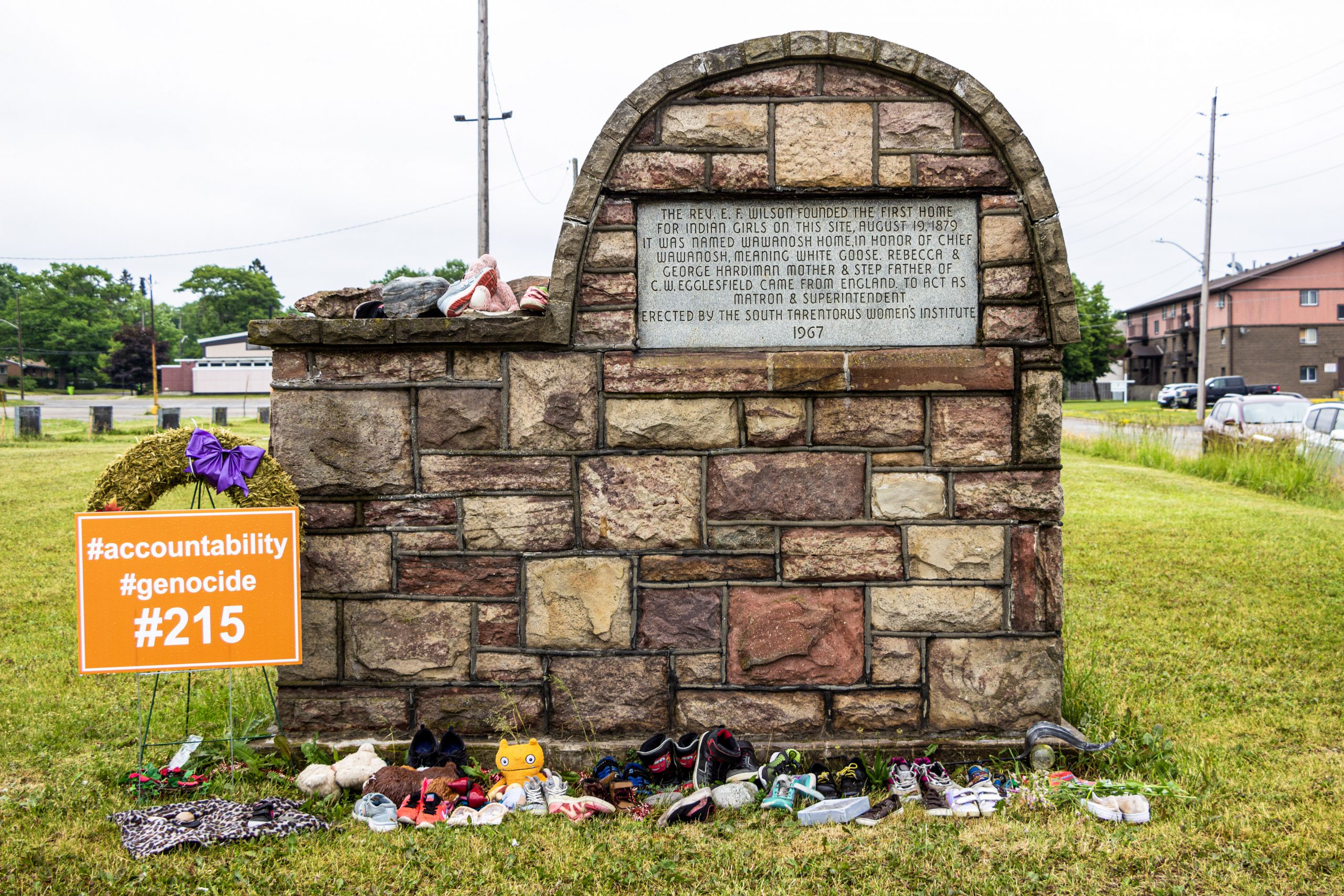Indianz.Com > News > The Conversation: Education system can’t remain silent on Native genocide

Reckoning with the truths of unmarked graves of Indigenous children, education systems must take action
Wednesday, September 29, 2021
The Conversation
The education system needs to help teachers address, repair and heal education towards and beyond reconciliation.
“It’s clear that there will be more unmarked graves found at residential schools, but what are we (educators) supposed to do? How are we supposed to fix this?”
These were questions posed by non-Indigenous teachers during a workshop we delivered in June on anti-Indigenous racism in curriculum to promote Indigenous cultural safety in schools.
When we hear these types of questions, we are reminded of our research that has documented a range of affective responses by settler educators in understanding Canada’s history of genocide against Indigenous children and communities, committed in the name of education through the Indian Residential School (IRS) system.
Even as the number of unmarked graves continues to rise and school flags remain lowered, there is little to no direction by the education system — by ministry officials, school district leaders or teacher federation advocates — on how to respond, process and educate in light of these tragedies and ensuing mass grief.
With no official mandate from ministries for systemic reform through training programs, regular discussion forums and gatherings, the education system runs the risk of cultivating more apathy and burnout among teachers, more ignorance from Canadians and more harms of settler colonialism and anti-Indigenous racism in schools.
This silence by the education system is potent and the message clear: reckoning with genocidal truths and the ongoing impacts of these harms in present day classrooms is not a priority but rather a personal decision left up to the individual teacher.

Settler teachers cannot tackle reconciliation alone
Many teachers long for a transformation of the education system towards more respectful relationships and equitable partnerships with Indigenous communities. They hope for a systemic effort that will concretely improve Indigenous students’ lives and make reconciliation a daily commitment in schools.
But when teachers receive little to no direction from their ministries or school boards, they are alone in classrooms, disconnected from their peers in processing these colonial atrocities and many revert to an individualized null response.
Some are reluctant to develop genuine relationships with Indigenous students or make connections with Indigenous Peoples, preferring to be a perfect stranger. Others become hesitant to engage with or teach the difficult knowledge of colonialism, preferring settler innocence. While others centre themselves as the baffled teacher, unable to critically examine their own complicity in the settler colonial structure of education.
What does the education system need to do?
The education system must resist shying away from discussing its legacies, truths and responsibilities by coming together to talk with Indigenous educators, leaders and advocates. Decolonizing education is a long process that requires systemic shifts to address ongoing cultural harms, anti-Indigenous racism and oppression against Indigenous children.
This systemic approach requires a co-ordinated mandate by education ministries, school boards/districts, teacher colleges and teacher federations to take a healing path forward with Indigenous partners, to move towards a collaborative, relational and culturally responsive system that is accountable to Indigenous Peoples and communities.
Settler educators need to decentre themselves in these partnerships so Indigenous people can speak more, take up space and reclaim their place and authority for determining what is best for Indigenous children. They should be determining what all students need to learn on Indigenous Land.
Former senator and Truth and Reconciliation Commission (TRC) chair Murray Sinclair has emphasized that education is the way towards reconciliation, and we believe teacher education is the means for disrupting the system’s ignorance, settler colonialism and white normativity. But education can only implement the TRC’s Calls to Action when it acts as a collective system focused on transformation.
Teachers cannot do this transformation alone in their classrooms. We need to hold ministries, school districts and teacher federations to account for space and funding to train the whole system to recognize anti-Indigenous racism, and address ongoing harms against Indigenous students.
If the leadership of ministries, school districts and teacher unions aren’t willing to discuss the unmarked graves of Indigenous children as legacies of colonialism and genocide that continue in education, then teachers will individually turn off, drop out and end up silent on these harms that continue to be reproduced in schools.
When ministries are not mandating this work of reckoning, repairing and healing by the whole education system, the momentum for teacher accountability in education-as-reconciliation risks being lost, buried and forgotten.Lisa Korteweg is an Associate Professor, Faculty of Education, at Lakehead University. Pauline Tennent is a Manager at the Centre for Human Rights Research at University of Manitoba. Tesa Fiddler is Indigenous community partner and Coordinator of Indigenous Education at Thunder Bay Catholic District School Board.
This article is republished from The Conversation under a Creative Commons license. Read the original article.
Search
Filed Under
Tags
More Headlines
Native America Calling: Native Playlist with Cary Morin and Status/Non-Status
Native America Calling: Native Hawaiians work to save birds with rich ecological and cultural significance
Native America Calling: Commod Bods, a standout frybread stand and Afro-Indigenous mutual aid
Press Release: Navajo Nation Council mourns passing of Rex Lee Jim
Press Release: National Congress of American Indians mourns passing of JoAnn Chase
Cronkite News: Native athletes and families cite racism at basketball playoffs
Native America Calling: Native Bookshelf with Devon Mihesuah
NAFOA: 5 Things You Need to Know This Week (February 23, 2026)
Chuck Hoskin: Cherokee Nation must not hide from history
Native America Calling: Assessing the outlook for domestic violence prevention
Source New Mexico: State reopens investigation into property once owned by Jeffrey Epstein
AUDIO: Section 106 Regulations at Advisory Council of Historic Preservation
Native America Calling: The growing artificial intelligence threat
Bureau of Indian Affairs considers first Tribal Energy Resource Agreement
Cronkite News: Death of Apache teenager still unsolved
More Headlines
Native America Calling: Native Hawaiians work to save birds with rich ecological and cultural significance
Native America Calling: Commod Bods, a standout frybread stand and Afro-Indigenous mutual aid
Press Release: Navajo Nation Council mourns passing of Rex Lee Jim
Press Release: National Congress of American Indians mourns passing of JoAnn Chase
Cronkite News: Native athletes and families cite racism at basketball playoffs
Native America Calling: Native Bookshelf with Devon Mihesuah
NAFOA: 5 Things You Need to Know This Week (February 23, 2026)
Chuck Hoskin: Cherokee Nation must not hide from history
Native America Calling: Assessing the outlook for domestic violence prevention
Source New Mexico: State reopens investigation into property once owned by Jeffrey Epstein
AUDIO: Section 106 Regulations at Advisory Council of Historic Preservation
Native America Calling: The growing artificial intelligence threat
Bureau of Indian Affairs considers first Tribal Energy Resource Agreement
Cronkite News: Death of Apache teenager still unsolved
More Headlines